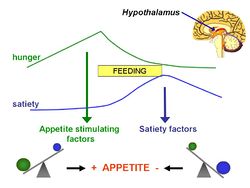Lipostatic hypothesis: Difference between revisions
Jump to navigation
Jump to search

imported>Charles James Vaillant Foster |
imported>Charles James Vaillant Foster |
||
| Line 17: | Line 17: | ||
http://web.ebscohost.com.ezproxy.webfeat.lib.ed.ac.uk/ehost/pdfviewer/pdfviewer?sid=44763b11-f169-4546-9aed-bf8f6570fcea%40sessionmgr111&vid=2&hid=108 | http://web.ebscohost.com.ezproxy.webfeat.lib.ed.ac.uk/ehost/pdfviewer/pdfviewer?sid=44763b11-f169-4546-9aed-bf8f6570fcea%40sessionmgr111&vid=2&hid=108 | ||
http://onlinelibrary.wiley.com.ezproxy.webfeat.lib.ed.ac.uk/doi/10.1002/bies.20539/abstract;jsessionid=06EE79E10F3045E19E20ECCD7385496F.d02t02 | |||
Revision as of 08:55, 11 October 2011
For the course duration, the article is closed to outside editing. Of course you can always leave comments on the discussion page. The anticipated date of course completion is 01 April 2012. One month after that date at the latest, this notice shall be removed. Besides, many other Citizendium articles welcome your collaboration! |
In 1953, Kennedy [1] proposed what became known as the lipostatic hyothesis. Specifically, he postulated the existence, in the hypothalamus, of a centre that was sensitive to the concentration of metabolites in the circulation, which prevented "an overall surplus of energy intake over expenditure."
References
Sophie Rajska 11:21, 10 October 2011 (UTC)
www.maximivanov.com/nutrition2.doc
http://ajpregu.physiology.org/content/286/1/R14.full
